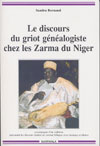|
Book reviews |
|
|
| |
Discourse of the genealogical
storyteller by the Zarma of Niger
Written by
Sandra Bornand |
|
| Content
|

|
|
|
Review
The storyteller is an important figure in a
society that is based, much more than our
western society, on exchange of knowledge and
customs via oral tradition. The narrator of
history of lineage and heroism of ancestors of
important leaders is at the forefront. This
book is a scientific work and therefore less
accessible for the layman interested in this
topic. Especially the considerations
(dissertations) require knowledge of the
anthropological jargon. Nevertheless, some parts
of the book can be easily read by layman and are
certainly interesting because the provide
understanding of the tradition of the Zarma
culture and its development. |
|
Back
|
|
|
Structure of the book
This scientific book starts with an
introduction describing in two chapters the
context of the research. The first chapter
discusses the problems of studying the oral
traditions, the second sketches the history
and language of the Zarma. The core of the
book consists of four parts each discussing
a specific topic of the research and
containing 2-4 chapters. The first part is
about the emic representation of the word,
the memory and the types of discourse in
Zarma society. The second part describes the
Zarma society and the role of the «
jasare », the holder of special oral
traditions. The third part focuses on the
power of denominate, being quoted in a
genealogical tree or being told about. This
part analyses the recorded discourses. The
fourth part pays attention to the strategy
of the « jasare » and way the
nobility thinks about the « jasare »
and how the listener physically reacts. The
books ends with conclusions titled "From the
power of the word to the power of the
discourse".
The CD-ROM contains the recording of 17
discourses as well as the transcription of them
in Zarma, a translation to French and a combined
Zarma - French file. In addition three map are
provided, two detailed maps, one east of Niamey
and one northwest of Dosso, and one of the
language regions in Niger. The CD-ROM also
contains six photos of « jasare » and six
flow charts of the structure of one the stories.
|
|
Back |
|
|
The author Arts doctors at the university of Lausanne
(Vice-chancellorship award 2003),
Sandra Bornand, of Swiss nationality, inquires into
oral traditions of the Zarma of Niger since
1994. Her training in literature and analyses of
the discourse incited her to accentuate the
relationship between word and power in her
research. She is the author of several articles
on the Zarma society, and currently she has a
fellowship of the Swiss National Funds (FNS). |
|
Back |
|
Text on back flap
« One night, while I attended a marriage
in Niamey, I saw the young groom trembling
while listening to his genealogy. They
explained to me that what I saw was a
natural effect of the discourse. I wanted to
understand why these words made him react
this way. »This anecdote constitutes the starting
point of the book. The author, after a long
experience with the subject and meetings of
training in the proximity of a great
storyteller, proposes an initiatory voyage
which includes several stages, corresponding
to different levels of knowledge: the word,
the memory, the oral tradition and the
genealogical storytellers.
The heart of this subject constitutes the
discursive skills of the genealogical
storytellers, and in particular the
relations of power they found with their
interlocutors. To explain a situation, that
is a priori unfavourable to her, as a « weak
» reference, the author seeks to detect the
traps which the speaker sets for the
receiver. On the basis of the discourse,
which constitutes an original corpus, she
chooses for an approach that follows the the
French ethno linguistic school by paying
special attention to the situation of
stating - more precisely, to the relation
between speaker and listener -, in order to
define that what is put on the line during
the utterance of a discourse of genealogical
storyteller.
|
|
Back |
|
Book in a nutshell
Extra
including a CD-ROM presenting a bilingual
version of the studied speeches (French and
Zarma) with music and photographs |
|
Back |
|

|
|
Last updated:
11 februari 2012
|
|
|
|